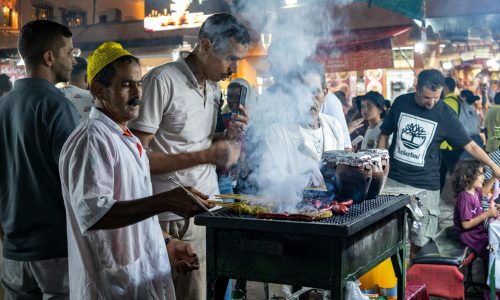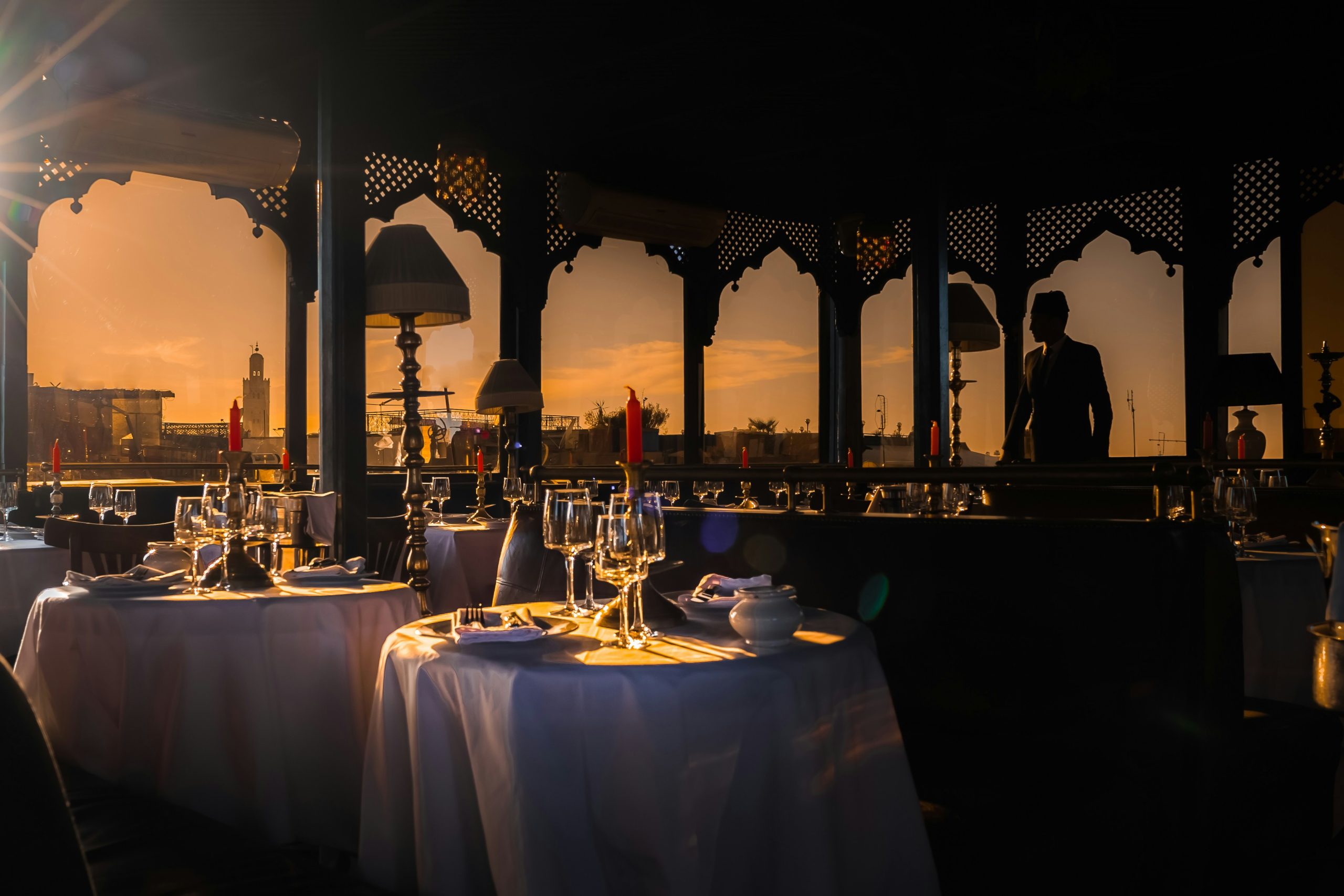
Moroccan Cuisine | Best of Moroccan Food
Moroccan cuisine, which has been refined over decades, is a stunning fusion of flavors, aromas, and customs.
Morocco provides a distinctive gastronomic encounter everywhere it goes.
We will discuss exquisite local Moroccan food, showcasing the complexity and diversity of this North African cuisine.
Moroccan cuisine, which has been refined over decades, is a stunning fusion of flavors, aromas, and customs. Morocco provides a distinctive gastronomic encounter everywhere it goes. We will discuss exquisite local Moroccan food, showcasing the complexity and diversity of this North African cuisine.
History of Moroccan Cuisine
Morocco’s gastronomic history is as rich and varied as the country’s cultural tapestry, thanks to centuries of trade, migration, and conquest. Over the years, Moroccan cuisine has evolved, drawing inspiration from Mediterranean ingredients, Arab cooking methods, Berber traditions, and the Moorish, Jewish, and with minimal European (French and Spanish) and sub-Saharan influences. It is renowned for having strong spices and vibrant tastes. A synopsis of the historical events that shaped Moroccan cuisine into the delicious meal it is today may be found below:
Morocco’s native Berber people, who have lived in the area for thousands of years, are responsible for much of the country’s gastronomic legacy. The use of regional ingredients, such as cereals, dates, olives, almonds, and a variety of fragrant herbs and spices, is emphasized in Berber cuisine. Even today, traditional Berber meals like tagine and couscous are mainstays of Moroccan cooking.
Arab Influence: When Arab inhabitants arrived in Morocco in the seventh century, the country’s culinary scene saw tremendous transformation. New components like rice, citrus fruits, almonds, and a range of spices like cumin, saffron, and cinnamon were introduced by Arab cuisine.
The Moors of southern Spain also contributed to these impacts by bringing pastilla, a pie that is much appreciated in Morocco. The French and British, who made contributions to Moroccan cuisine more recently, had less of an impact.
Moroccan meals frequently consist of couscous, fish, or vegetables and are seasoned with flavorful spices. The country’s bounty of fruit and vegetables, lamb, almonds, walnuts, olives, and argan and olive oils are all used in Moroccan Jewish cooking. A lot of spices and condiments are used in it, like cumin, cinnamon, ginger, saffron, paprika, garlic, olives, preserved lemon, and Ras el Hanout (a blend of the greatest spices).
We frequently cook beef meals with fruit. Thus, Moroccan Jews appreciate eating organ meats, just like their Muslim counterparts. Couscous, the national cuisine, is eaten in several variations with meat, onions, and vegetables. Cooked salads are a common part of many meals. The dinner is finished with fruit and pastries stuffed with almond paste.
Moroccan cuisine has maintained its distinct identity in spite of these influences, which is typified by its hearty flavours, complex spice mixes, and emphasis on communal dining. Whether it’s being eaten at a classy restaurant, a family home, or a busy souk, a traditional Moroccan meal never fails to captivate guests with its complex flavours and fascinating history. It is a priceless part of the cultural heritage of the country.
What is the Best Moroccan Food?
Choosing the “best” Moroccan food can be subjective as it depends on personal taste preferences and individual experiences. However, there are several iconic Moroccan dishes that are widely celebrated for their rich flavors, cultural significance, and culinary craftsmanship.
What does Moroccan food Taste like?
The taste of Moroccan cuisine is characterized by a harmonious blend of flavors, textures, and aromas, creating a symphony for the taste buds. Here’s a glimpse into what local Moroccan food tastes like:
Bold and Spicy: Moroccan cuisine is known for its bold and vibrant flavors, often attributed to the skillful use of spices. Commonly used spices include cumin, coriander, paprika, ginger, cinnamon, saffron, and turmeric. These spices add depth and complexity to dishes, infusing them with warmth and aromatic richness.
Sweet and Savory: One of the defining characteristics of Moroccan cuisine is its adept balancing of sweet and savory flavors. Many traditional Moroccan dishes, such as tagine and pastilla, incorporate a combination of sweet and savory ingredients. For example, dried fruits like dates, apricots, and raisins are often used to add a subtle sweetness to savory dishes, creating a tantalizing contrast of flavors.
Tender and Succulent: Moroccan cooking techniques, such as slow-cooking in clay pots (tagines) or braising meats with spices and aromatic ingredients, result in tender and succulent dishes. Whether it’s a melt-in-your-mouth lamb tagine or a fork-tender chicken pastilla, Moroccan food is celebrated for its luscious textures and mouthwatering tenderness.
Aromatic and Fragrant: The use of fresh herbs and aromatic ingredients is another hallmark of Moroccan cuisine. Ingredients like fresh mint, cilantro, parsley, and preserved lemons add brightness and freshness to dishes, while also contributing to their fragrant aroma. The scent of Moroccan spices wafting from the kitchen is enough to whet anyone’s appetite.
Nutty and Earthy: Moroccan cuisine often incorporates a variety of nuts, such as almonds, walnuts, and pine nuts, which add a delightful crunch and nutty flavor to dishes. Nuts are commonly used in both savory and sweet dishes, adding a layer of richness and depth to the overall flavor profile.
Tangy and Citrusy: Citrus fruits, particularly lemons, play a prominent role in Moroccan cuisine. Preserved lemons, in particular, are a staple ingredient in many Moroccan dishes, lending a tangy and slightly salty flavor that enhances the taste of savory dishes. Freshly squeezed lemon juice is also used to add brightness and acidity to salads, sauces, and marinades.
Are there Vegetarian or Vegan restaurants in Morocco?
Yes, there are vegetarian and vegan restaurants in Morocco, although they may not be as common as in some other countries. In recent years, there has been a growing awareness of vegetarian and vegan diets in Morocco, driven by both health and environmental concerns, as well as an increasing number of tourists seeking plant-based options.
What are the Top 10 Best Moroccan foods?
We have put together a list of the Best Moroccan Food that is typically famous among locals and travelers:
Tagine: typically consists of tender meat (often lamb or chicken) slow-cooked with a medley of spices, dried fruits, and vegetables. The result is a succulent and aromatic stew that tantalizes the senses. We also serve delicious vegetable tagines that are made with seasonal veggies and a blend of fresh spices.
Couscous: Couscous holds a special place in Moroccan hearts as a staple food. Made from steamed semolina grains, couscous is often served as a base for flavorful stews or as a side dish accompanying meat or vegetables. The delicate texture of couscous perfectly complements the hearty flavors of Moroccan cuisine.
Pastilla: Indulge your taste buds with the exquisite flavors of pastilla, a traditional Moroccan pie. Layers of thin pastry encase a sumptuous filling of spiced meat (usually pigeon or chicken), almonds, eggs, and aromatic herbs. Topped with a dusting of powdered sugar and cinnamon, pastilla strikes a perfect balance between sweet and savory.
Harira: A soup that is often enjoyed during Ramadan to break the fast. Made with a base of tomatoes, lentils, chickpeas, and spices, harira is a nutritious and comforting dish. It’s often served with dates and chebakia, a sweet pastry, creating a satisfying meal that nourishes both body and soul.
Bissara: A soup and a bean dip of Moroccan cuisine of Berber origin. Prepared with dried puréed broad beans as a primary ingredient along with olive oil. Additional ingredients include garlic, cumin, and salt. Once served, you can add hot peppers, more garlic or squeeze a lemon which adds more flavors.
Kefta Tagine: It showcases the culinary prowess of Moroccan cooks in crafting flavorful meat dishes. Ground meat, usually lamb or beef, is seasoned with a blend of spices, shaped into small meatballs, and simmered in a rich tomato-based sauce. Kefta tagine is a beloved comfort food in Morocco.
Moroccan Mint Tea: No meal in Morocco is complete without a refreshing glass of Moroccan mint tea. Made with green tea, fresh mint leaves, and a generous amount of sugar, this sweet and aromatic beverage is an integral part of Moroccan hospitality. Sip on a cup of mint tea while soaking in the vibrant sights and sounds of a Moroccan market.
Mechoui: For meat lovers, mechoui is a must-try dish that showcases the art of slow-roasting. The whole lamb or goat is seasoned with a blend of spices, and then slowly roasted until tender and succulent. The result is a melt-in-your-mouth delicacy that is often served at festive occasions and celebrations.
Zaalouk: A flavorful Moroccan salad made from roasted eggplant, tomatoes, garlic, and spices. The ingredients are cooked down to a silky-smooth consistency, resulting in a rich and savory dip that pairs perfectly with crusty bread or as a side dish to grilled meats. Zaalouk is a testament to the vibrant flavors of Moroccan vegetables.
M’smen: End your culinary journey through Morocco with a taste of m’smen, a traditional flatbread that is both flaky and chewy. Made from a dough of flour, semolina, and butter, m’smen is folded and cooked on a griddle until golden brown and crispy. Enjoy m’smen on its own or with a dollop of honey or jam for a delightful treat.
Moroccan cuisine is a feast for the senses, with its bold flavors, aromatic spices, and exquisite presentation. From the iconic tagine to the delicate flavors of pastilla, each dish tells a story of tradition, culture, and culinary ingenuity. So, embark on a culinary adventure and savor the flavors of Morocco with these 10 delectable dishes that are sure to transport your taste buds to the enchanting streets of Marrakech and beyond.
Moroccan street food Guidelines
Moroccan street cuisine offers a variety of delectable selections and is a true expression of the nation’s culinary heritage. Popular foods from the street include:
Moroccan tagine: This stew is a mainstay of Moroccan cooking and is offered at numerous food stands. It usually contains vegetables or tender meat (such as chicken, lamb, or beef), cooked with a mixture of enticing spices, and eaten with bread or couscous.
Moroccan Sandwiches: Moroccan street food vendors sell a range of sandwiches. Merguez sandwiches (a spicy sausage), fried fish sandwiches, and shawarma-style sandwiches with grilled meat and veggies are a few of the most well-liked choices.
Moroccan Sweets: Street sellers provide a range of Moroccan pastries and sweets. Try local foods like chebakia (honey biscuits with sesame coating), msemen (fluffy pancakes), or Moroccan pastilla (a sweet and savory pastry filled with meat or fish).
There are numerous street foods in Morocco including Maquouda (potato cake), more than 10 different natural honeys, soups, pancakes, and other delicacies.
Is Moroccan Food Spicy?
Moroccan food can be spicy, but not all dishes are excessively so. The level of spiciness in Whether you prefer mild flavors or enjoy a bit of heat, traditional Moroccan food offers a diverse range of options to suit various palates. Moroccan cuisine varies depending on the dish and the region. Also, you always have the option to ask for your food to be with or without hot flavors.
Is Morocco Food Healthy & Safe?
Moroccan food is generally considered healthy, with many dishes incorporating fresh ingredients such as vegetables, fruits, legumes, whole grains, nuts, and lean proteins. The Mediterranean-inspired diet prevalent in Morocco emphasizes the consumption of nutrient-rich foods and minimizes processed ingredients, which aligns with the principles of healthy eating.
In terms of safety, Moroccan food is generally safe to eat. However, travelers should exercise caution. It’s advisable to drink bottled or filtered water and to avoid consuming raw or undercooked foods, particularly meats and seafood.
Overall, Moroccan food offers a flavorful and nutritious dining experience that can contribute to a healthy lifestyle when enjoyed as part of a balanced diet. By savoring the diverse flavors and wholesome ingredients of Moroccan cuisine, individuals can embrace the health benefits and culinary delights that this vibrant culinary tradition has to offer.
Does Moroccan food contain nuts?
Yes, Moroccan food often contains nuts as they are a common ingredient in many traditional dishes. Nuts are valued for their flavor, texture, and nutritional benefits, and they add richness and complexity to Moroccan cuisine. Here are some examples of how nuts are used in Moroccan cooking:
Almonds: Almonds are one of the most widely used nuts in Moroccan cuisine. They are often blanched, skinned, and ground into almond meal or paste to thicken sauces, such as in tagines or pastilla (a savory pastry filled with meat, eggs, and almonds). Whole almonds are also commonly used as a garnish for dishes like couscous and salads.
Walnuts: Walnuts are another popular nut in Moroccan cooking, prized for their rich, earthy flavor. They are often used in sellou (a traditional sweet made with ground almonds, sesame seeds, and walnuts).
Pistachios: Pistachios are used to add color, texture, and flavor to a variety of Moroccan dishes. They are commonly found in desserts, such as halwa.
Hazelnuts: While not as common as other nuts, hazelnuts are sometimes used in Moroccan cooking, particularly in desserts and pastries. They can be ground into a flour for cakes and cookies, or chopped and folded into sweet fillings for pastries like briouats (phyllo dough pastries filled with nuts, spices, and honey).
Overall, nuts play a significant role in Moroccan cuisine, adding depth, texture, and flavor to a wide range of dishes. However, individuals with nut allergies should exercise caution and inquire about the presence of nuts in dishes when dining out in Morocco.
Are you a fan of Morocco and local Moroccan food? Check out our Moroccan Food circuit specially made for extreme foodies who would love to dive in into Morocco by tasting its delicacies. Let’s discover this incredible tour together, planned with passion by our Female – Led Team.




